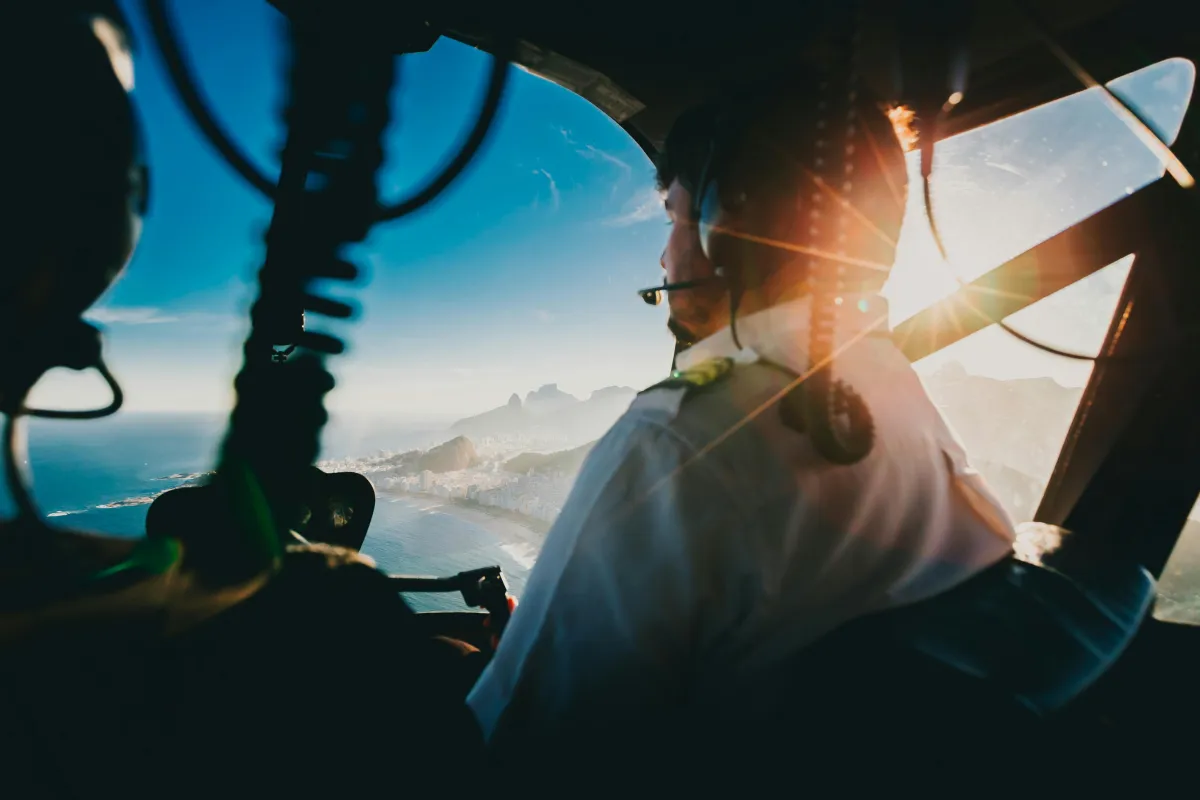Individual Therapy Blogs

Enhance Your Flight: Cognitive Behavioral Therapy for Pilots
Cognitive Behavioral Therapy for Pilots: Effective Mental Health and Anxiety Management Solutions
A Research-Informed Approach to Managing Flight Anxiety and Enhancing Mental Wellness
The aviation industry demands peak mental performance, emotional regulation, and rapid decision-making under stress. For pilots, managing occupational stress isn't optional—it's a matter of both safety and health care. Cognitive Behavioral Therapy (CBT), supported by extensive research and clinical trials, has emerged as one of the most effective psychological interventions for treating anxiety, fear of flying, major depressive disorder, and other comorbidities that affect aviation professionals.
With growing awareness of mental health needs among pilots and Federal Aviation Administration (FAA) emphasis on aircrew well-being, CBT provides practical, evidence-based tools to mitigate risk, enhance sleep hygiene, improve cognition, and promote lasting emotional resilience.
What Is Cognitive Behavioral Therapy and How Does It Help Pilots?
CBT is a structured, goal-oriented form of psychological treatment focused on the interconnection between thoughts, feelings, and behaviors. It helps patients recognize maladaptive thought patterns and replace them with more functional alternatives—an especially vital skill in high-pressure environments like the cockpit.
CBT’s efficacy is well-supported by randomized controlled trials and systematic reviews indexed in PubMed, with many studies reporting moderate to large effect sizes for treating anxiety disorders, depression, and occupational stress.
For pilots, CBT offers:
Cognitive restructuring to reduce catastrophic thinking
Behavioral activation to combat avoidance behaviors
Exposure therapy to gradually desensitize flight-related phobias
Tools to manage social stigma, fear of negative evaluation, and anger
How Does CBT Address Mental Health Challenges in Pilots?
Pilots face unique psychological stressors, including:
Sleep disruption and fatigue from irregular schedules
Fear of losing licensure due to psychiatric diagnoses
Pressure to mask symptoms due to social stigma and career concerns
Heightened risk of substance abuse as a maladaptive coping strategy
Exposure to traumatic events and emotional numbing
CBT offers a noninvasive, stigma-reducing approach to care that can be delivered via in-person or virtual sessions, mobile apps, or online therapy programs—increasing adherence and accessibility across aviation schedules.
What Are the Key Principles of CBT for Aviation Professionals?
CBT for pilots integrates:
Standardized assessment using tools like the Patient Health Questionnaire (PHQ-9)
Psychoeducation about psychopathology and stress
Cognitive restructuring of flight-related fears
Exposure therapy and simulation training
Behavioral techniques for sleep hygiene and attention regulation
Ongoing goal setting and performance tracking
These strategies are designed with clinical reliability, convergent validity, and discriminant validity in mind, ensuring measurable improvements and reduced disease burden over time.
How Is CBT Different From Other Therapies for Pilots?
Unlike some open-ended or insight-driven approaches (e.g., psychodynamic therapy), CBT is:
Time-limited and data-driven
Backed by meta-analyses and clinical research
Focused on reducing symptoms and enhancing function quickly
Aligned with aviation medicine protocols and FAA policies
In comparison to medicine-only models using selective serotonin reuptake inhibitors (SSRIs), CBT also avoids pharmacological side effects and is often the first-line therapy for patients with flight anxiety or bipolar disorder in remission.
What Mental Health Issues Are Most Common Among Pilots?
According to current epidemiology studies and airline wellness reports, pilots experience elevated rates of:
Generalized anxiety disorder
Social anxiety and fear of negative evaluation
Sleep disorders
Major depressive disorder
Borderline personality disorder traits (e.g., emotional dysregulation)
Substance use disorders (especially alcohol misuse)
These conditions frequently present with comorbidity, complicating both diagnosis and treatment adherence. CBT is adaptable to complex cases, including those involving suicidal ideation, anger management issues, or chronic hypertension—a risk factor worsened by psychological strain.
How Does Flight Anxiety Affect Performance and Safety?
Fear of flying (aviophobia) may be rooted in:
Past trauma
Loss of control
Perfectionism
Adverse physiological reactions (e.g., tachycardia, hyperventilation)
Untreated, this phobia can impair attention, elevate adverse event risk, and jeopardize aviation safety. CBT enables pilots to challenge irrational thoughts and gradually recondition their psychological and somatic responses through controlled exposure therapy, sometimes enhanced with virtual reality tools under institutional review board-approved protocols.
CBT Delivery Formats for Pilots
Individual Therapy
Allows deep focus on personal triggers, comorbidity, and long-term behavior change.
Group Therapy
Reduces loneliness, normalizes experiences, and facilitates peer-based confidence building.
Online Modules and Apps
Promote flexibility and adherence using secure platforms and Creative Commons-licensed exercises.
CBT Workshops and Education Programs
Provide standardized skill-building aligned with American Psychiatric Association guidelines and health care system protocols.
How Does CBT Improve Sleep and Cognition?
Through sleep hygiene education, CBT targets insomnia by:
Recalibrating circadian rhythms
Reducing pre-sleep cognitive activation
Managing anxiety related to restlessness or nightmares
Promoting restorative routines even during duty rotations
Enhanced cognition, including executive function, working memory, and emotional regulation, leads to better checklist compliance, CRM communication, and threat detection during flights.
How Can Pilots Access Specialized CBT Services?
Pilots should seek licensed mental health professionals with:
Aviation psychology or psychiatry backgrounds
Knowledge of FAA regulations, informed consent protocols, and confidentiality standards
Experience working with active duty military, veterans, or high-performance occupations
Many CBT providers now publish open access articles, case studies, and descriptive statistics on outcomes—making it easier to verify quality of care.
When Should Pilots Seek CBT or Professional Help?
Pilots should pursue CBT when experiencing:
Persistent worry or anxiety symptoms
Cognitive fatigue or attention lapses
Disturbed sleep patterns
Sudden mood changes, anger, or relationship strain
Phobia or panic during takeoffs, turbulence, or emergencies
Avoidance of certain aircraft types or routes
Thoughts of suicidal ideation, helplessness, or loss of purpose
Timely intervention reduces risk and improves both mental health outcomes and flight safety performance.
Conclusion: CBT Is Part of the Safety Checklist
Just as pilots rely on checklists and simulations to ensure safe flights, they can rely on Cognitive Behavioral Therapy to ensure sound mental health, better cognition, and reduced occupational risk.
CBT is no longer an experimental solution—it’s a proven, research-supported therapy program backed by data from clinical trials, meta-analyses, and pilot-specific studies published under Creative Commons licenses in academic databases like PubMed.
In aviation, mental clarity isn’t optional—it’s essential. CBT helps ensure you fly with both confidence and control.

Stephen Rought, LCSW
Proudly Accepting
Aetna and Medicare Insurance


Disclaimer
Stephen Rought, LCSW does not guarantee any specific outcome. All content provided on the Stephen Rought, LCSW website is provided for educational or informational purposes only. Consult medical professionals you are working with about whether any opinions or recommendations provided through this website apply to you and your unique circumstances
Currently, all online therapy sessions are conducted using the HIPPA compliant Telehealth service doxy.me
SErvices
Individual Therapy
Parent Coaching
Financial Therapy
Couples Counseling
Family Therapy
